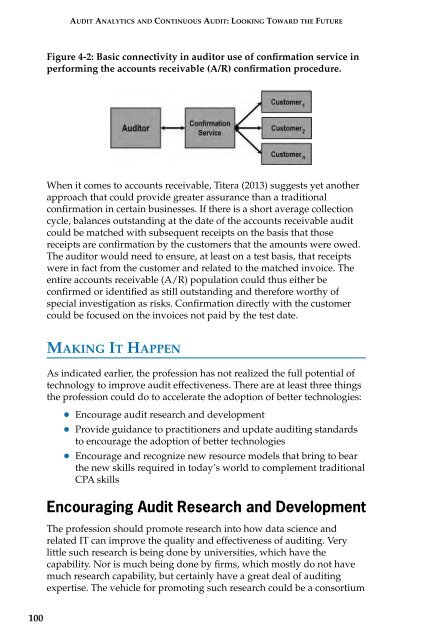AUDIT ANALYTICS AUDIT
1JWn3ix
1JWn3ix
Create successful ePaper yourself
Turn your PDF publications into a flip-book with our unique Google optimized e-Paper software.
<strong>AUDIT</strong> <strong>ANALYTICS</strong> AND CONTINUOUS <strong>AUDIT</strong>:LOOKING TOWARD THE FUTURE<br />
Figure 4-2: Basic connectivity in auditor use of confirmation service in<br />
performing the accounts receivable (A/R) confirmation procedure.<br />
When it comes to accounts receivable, Titera (2013) suggests yet another<br />
approach that could provide greater assurance than a traditional<br />
confirmation in certain businesses. If there is a short average collection<br />
cycle, balances outstanding at the date of the accounts receivable audit<br />
could be matched with subsequent receipts on the basis that those<br />
receipts are confirmation by the customers that the amounts were owed.<br />
The auditor would need to ensure, at least on a test basis, that receipts<br />
were in fact from the customer and related to the matched invoice. The<br />
entire accounts receivable (A/R) population could thus either be<br />
confirmed or identified as still outstanding and therefore worthy of<br />
special investigation as risks. Confirmation directly with the customer<br />
could be focused on the invoices not paid by the test date.<br />
MAKING IT HAPPEN<br />
As indicated earlier, the profession has not realized the full potential of<br />
technology to improve audit effectiveness. There are at least three things<br />
the profession could do to accelerate the adoption of better technologies:<br />
Encourage audit research and development<br />
Provide guidance to practitioners and update auditing standards<br />
to encourage the adoption of better technologies<br />
Encourage and recognize new resource models that bring to bear<br />
the new skills required in today’s world to complement traditional<br />
CPA skills<br />
Encouraging Audit Research and Development<br />
The profession should promote research into how data science and<br />
related IT can improve the quality and effectiveness of auditing. Very<br />
little such research is being done by universities, which have the<br />
capability. Nor is much being done by firms, which mostly do not have<br />
much research capability, but certainly have a great deal of auditing<br />
expertise. The vehicle for promoting such research could be a consortium<br />
100


